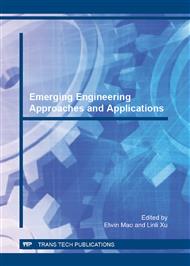[1]
BLAZE M, FEIGENBAUM J, LACY J. Decentralized trust management [A]. Proceedings of the 17th Symposium on Security and Privacy[C]. Oakland CA, 1996. 164-173.
DOI: 10.1109/secpri.1996.502679
Google Scholar
[2]
TANG W, CHEN Z. Research of subjective trust management model based on the fuzzy set theory [J]. Journal of Software, 2003, 14(9): 1401-1408(in Chinese with English abstract).
Google Scholar
[3]
TANG W, HU J B, CHEN Z. Research on a fuzzy logic-based subjective trust management model[J]. Journal of Computer Research and Development, 2005, 42(10): 1654-1659(in Chinese with English abstract).
DOI: 10.1360/crad20051002
Google Scholar
[4]
Beth T, Borcherding M, Klein B. Valuation of Trust in open network [A]. Proceedings of the European Symposium on Research in Computer Security (ESORICS) [C]. New York: Springer-Verlag , 1994. 3-18.
DOI: 10.1007/3-540-58618-0_53
Google Scholar
[5]
JøSANG A, KNAPSKOG S J. A metric for trusted systems[A]. Global IT Security. Wien: Austrian Computer Society[C]. 1998. 541-549.
Google Scholar
[6]
JøSANG A. Trust-Based decision making for electronic transactions[A]. Proceedings of the 4th Nordic Workshop on Secure Computer Systems(NORDSEC'99)[C]. (1999).
Google Scholar
[7]
Jsang A, Ismail R. The Beta Reputation System. In Proceedings of the 15"Bled Electronic Comrnerce Conference, Bled, Slovena, June 2002. 708-721.
Google Scholar
[8]
L. Mui, M. Mohtashemi, and A. Halberstadt. A Computational Model of Trust and Reputation for E-businiess. Proceedings of the 35th Hawaii International Conference on System Sciences, Big Island, Hawaii January (2002).
DOI: 10.1109/hicss.2002.994181
Google Scholar
[9]
Y Wang, J. Uassileva. Bayesian Network-Based Trust Model. Proceedings of IEEE/WIC International Conference on Intelligence(WI2003) Halifax, Canada, October 2003. 13-17.
Google Scholar
[10]
B. Yu, M.P. Singh. An Evidential Model of Distributed Reputation Management [C]. In: Proceedings of the First International Joint Conference on Autonomous Agents and Multi-Agent Systems, 2002, 294-301.
DOI: 10.1145/544741.544809
Google Scholar
[11]
D.W. Manchala. E-Commerce Trust Metrics and Models [J]. IEEE Internet Computing, 2000, 4(2): 36-44.
DOI: 10.1109/4236.832944
Google Scholar
[12]
J. Sabater, C. Sierra. REGRET: A Reputation Model for Gregarious Societies[C]. In: Proceedings of the 4th Int. Workshop on Deception, Fraud and Trust in Agent Societies, in the 5th Int. Conference on Autonomous Agents, 2001, 61-69.
DOI: 10.1145/375735.376110
Google Scholar


